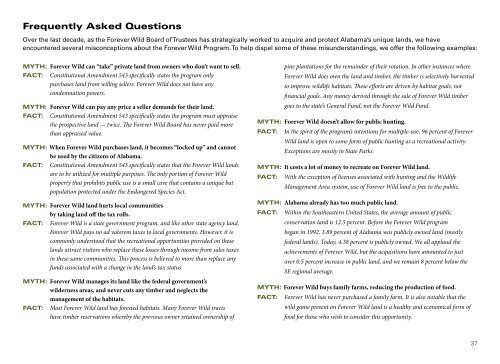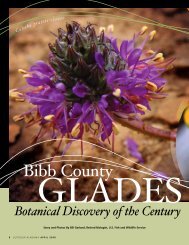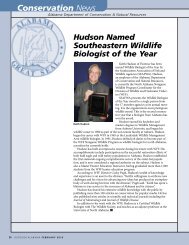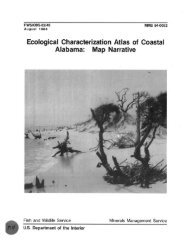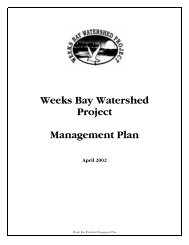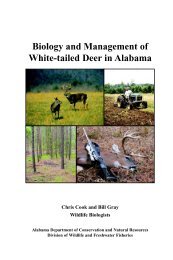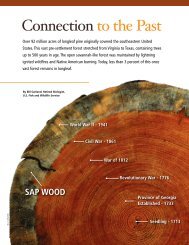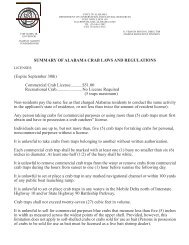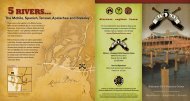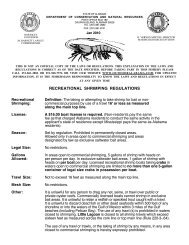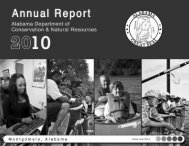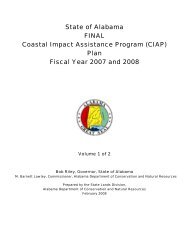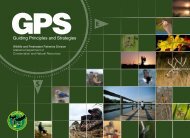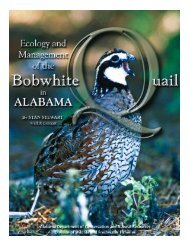The Forever Wild Land Trust - Alabama Department of Conservation ...
The Forever Wild Land Trust - Alabama Department of Conservation ...
The Forever Wild Land Trust - Alabama Department of Conservation ...
You also want an ePaper? Increase the reach of your titles
YUMPU automatically turns print PDFs into web optimized ePapers that Google loves.
Frequently Asked Questions<br />
Over the last decade, as the <strong>Forever</strong> <strong>Wild</strong> Board <strong>of</strong> <strong>Trust</strong>ees has strategically worked to acquire and protect <strong>Alabama</strong>’s unique lands, we have<br />
encountered several misconceptions about the <strong>Forever</strong> <strong>Wild</strong> Program. To help dispel some <strong>of</strong> these misunderstandings, we <strong>of</strong>fer the following examples:<br />
MYTH: <strong>Forever</strong> <strong>Wild</strong> can “take” private land from owners who don’t want to sell.<br />
FACT: Constitutional Amendment 543 specifically states the program only<br />
purchases land from willing sellers. <strong>Forever</strong> <strong>Wild</strong> does not have any<br />
condemnation powers.<br />
MYTH: <strong>Forever</strong> <strong>Wild</strong> can pay any price a seller demands for their land.<br />
FACT: Constitutional Amendment 543 specifically states the program must appraise<br />
the prospective land — twice. <strong>The</strong> <strong>Forever</strong> <strong>Wild</strong> Board has never paid more<br />
than appraised value.<br />
MYTH: When <strong>Forever</strong> <strong>Wild</strong> purchases land, it becomes “locked up” and cannot<br />
be used by the citizens <strong>of</strong> <strong>Alabama</strong>.<br />
FACT: Constitutional Amendment 543 specifically states that the <strong>Forever</strong> <strong>Wild</strong> lands<br />
are to be utilized for multiple purposes. <strong>The</strong> only portion <strong>of</strong> <strong>Forever</strong> <strong>Wild</strong><br />
property that prohibits public use is a small cave that contains a unique bat<br />
population protected under the Endangered Species Act.<br />
MYTH: <strong>Forever</strong> <strong>Wild</strong> land hurts local communities<br />
by taking land <strong>of</strong>f the tax rolls.<br />
FACT: <strong>Forever</strong> <strong>Wild</strong> is a state government program, and like other state agency land,<br />
<strong>Forever</strong> <strong>Wild</strong> pays no ad valorem taxes to local governments. However, it is<br />
commonly understood that the recreational opportunities provided on these<br />
lands attract visitors who replace these losses through income from sales taxes<br />
in these same communities. This process is believed to more than replace any<br />
funds associated with a change in the land’s tax status.<br />
MYTH: <strong>Forever</strong> <strong>Wild</strong> manages its land like the federal government’s<br />
wilderness areas, and never cuts any timber and neglects the<br />
management <strong>of</strong> the habitats.<br />
FACT: Most <strong>Forever</strong> <strong>Wild</strong> land has forested habitats. Many <strong>Forever</strong> <strong>Wild</strong> tracts<br />
have timber reservations whereby the previous owner retained ownership <strong>of</strong><br />
pine plantations for the remainder <strong>of</strong> their rotation. In other instances where<br />
<strong>Forever</strong> <strong>Wild</strong> does own the land and timber, the timber is selectively harvested<br />
to improve wildlife habitats. <strong>The</strong>se efforts are driven by habitat goals, not<br />
financial goals. Any money derived through the sale <strong>of</strong> <strong>Forever</strong> <strong>Wild</strong> timber<br />
goes to the state’s General Fund, not the <strong>Forever</strong> <strong>Wild</strong> Fund.<br />
MYTH: <strong>Forever</strong> <strong>Wild</strong> doesn’t allow for public hunting.<br />
FACT: In the spirit <strong>of</strong> the program’s intentions for multiple-use, 96 percent <strong>of</strong> <strong>Forever</strong><br />
<strong>Wild</strong> land is open to some form <strong>of</strong> public hunting as a recreational activity.<br />
Exceptions are mostly in State Parks.<br />
MYTH: It costs a lot <strong>of</strong> money to recreate on <strong>Forever</strong> <strong>Wild</strong> land.<br />
FACT: With the exception <strong>of</strong> licenses associated with hunting and the <strong>Wild</strong>life<br />
Management Area system, use <strong>of</strong> <strong>Forever</strong> <strong>Wild</strong> land is free to the public.<br />
MYTH: <strong>Alabama</strong> already has too much public land.<br />
FACT: Within the Southeastern United States, the average amount <strong>of</strong> public<br />
conservation land is 12.5 percent. Before the <strong>Forever</strong> <strong>Wild</strong> program<br />
began in 1992, 3.89 percent <strong>of</strong> <strong>Alabama</strong> was publicly owned land (mostly<br />
federal lands). Today, 4.38 percent is publicly owned. We all applaud the<br />
achievements <strong>of</strong> <strong>Forever</strong> <strong>Wild</strong>, but the acquisitions have amounted to just<br />
over 0.5 percent increase in public land, and we remain 8 percent below the<br />
SE regional average.<br />
MYTH: <strong>Forever</strong> <strong>Wild</strong> buys family farms, reducing the production <strong>of</strong> food.<br />
FACT: <strong>Forever</strong> <strong>Wild</strong> has never purchased a family farm. It is also notable that the<br />
wild game present on <strong>Forever</strong> <strong>Wild</strong> land is a healthy and economical form <strong>of</strong><br />
food for those who wish to consider this opportunity.<br />
37


